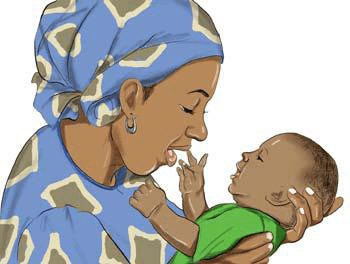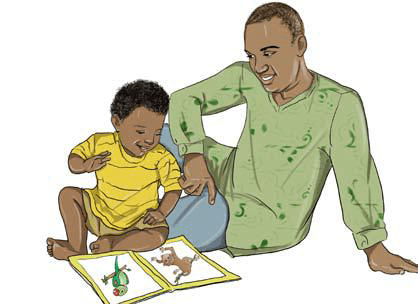Children learn language through play and interaction with their families and peers. In some degree infant‘s communication is different from adulthood communication so that, infants address their feeling by communicating through eye contact, crying (during hunger or pain), smiling, laughing and gesture or by any body movement. To develop adequate skills in communication children need to attend and listen to sounds, words and people talking and they can understand and use gestures, sounds, and words. During this type of communication, the mothers or caregivers should notice, understand and respond the feeling of infants.
Norms for Infant and child communication
- Typically babies create sounds starting at birth to show hunger, pleasure or any discomfort like pain. Early forms of communication of infants are sounds and gestures.
- Babies‘ understanding of words develops (8-10 months) before they use their first words (approximately 12-18 months).
- By two years children may be using short two-word sentences (e.g. "drink gone", "bye bye daddy").
- Their understanding of language progresses rapidly over the period from 12 months to 3 years. From understanding names of familiar objects, they will move to understanding simple questions, words like "hot" or "cold" and "in" and "on".
- Children can combine two words at approximately two years as children get older, their sentences get longer, they will ask many questions.
- From 3 to 5 years, children learn to understand more difficult words e.g. those referring to time and place such as "behind", "morning", "before". They will use longer sentences, combining ideas with words like "and", "because" and "but" by around five years, children can answer simple questions about a story. Their speech will be clearly understood by strangers by five years of age.
- While it is recognised that much speech, language and communication development has taken place by the time a child enters primary school. Language learning is a lifetime process, and children continue to acquire language through the school-age and adolescent years.
- From about 7- 8 years onwards, children acquire as much language through reading as they do through verbal interaction. New vocabulary, complex grammar, and the ability to use language to discuss & influence others.
The importance of play in early childhood development
- To increase mental and physical development.
- To improve bonding between mothers and children.
- It helps the children to learn social and motor skills and cognitive thinking.
- Play will make a child productive for the future.
- The children will have a positive attitude towards their family and society.
- Play gives children the opportunity to test their beliefs about the world.
- Children increase their problem-solving abilities.
Types of play
As your child grows and develops, his or her play becomes developed. Certain types of play are associated with the age group, but not restricted to those specific age groups.
- Unoccupied play
In the early months of infancy, from birth to about three months, your child is busy in unoccupied play. Children seem to be making random movements with no clear purpose, but this is the initial form of playing
- Solitary play
From three to 18 months, babies will spend much of their time playing on their own. During solitary play, children are very busy with play and they may not notice other children sitting or playing nearby him or her. They are exploring their world by watching, grabbing and rattling objects. Solitary play begins in infancy and is common in toddlers. It is important for all age groups to have some time to play by themselves.
- Onlooker play
Onlooker play happens most often during the toddler years. This is where the child watches other children play. Children are learning how to relate to others and learning the language. Although children may ask questions of other children, there is no effort to join the play. This type of play usually starts during toddler years but can take place at any age.
- Parallel play:
From the age of 18 months to two years, children begin to play next to other children without any communication or interaction. This is called the parallel play. Parallel play provides your toddler with opportunities for role-playing such as dressing up and imagining. It also helps children gain the understanding of the idea of property right such as "mine" They begin to show their need of being with other children their age. Parallel play is usually found with toddlers, although it happens in any age group.
- Associative play:
When your children are around three to four years of age, they become more interested in other children than the toys. Your child has started to socialise with other children. This play is sometimes referred to as "loosely organised play." Associative play helps your preschooler learn the do's and don'ts of getting along with others. Associative play teaches the art of sharing, encourages language development, problem-solving skills, and cooperation. In the associative play, groups of children have similar goals. They do not set rules, although they all want to be playing with the same types and there is no formal organisation.
- Social play:
Children around the age of three are beginning to socialise with other children‘s by interacting with other children in playing settings. Your child learns social rules such as give and take and cooperation; children can share toys and ideas, and they are beginning to learn to use moral reasoning to develop a sense of values to be prepared to function in the adult world and children need to experience a variety of social situations.
- Motor or physical play:
When children run, jump, and play games such as hide and seek and tag, they engage in physical play. Physical play offers a chance for children to exercise and develop muscle strength. Physically playing with your child teaches social skills while enjoying good exercise. Your child will learn to take turns and accept winning or losing.
- Constructive play:
In this type of play, children create things. Constructive play starts in infancy and becomes more complex as your child grows. This type of play starts with your baby putting things in his/her mouth to see how they feel and taste. As a toddler, children begin building with blocks, playing in the sand, and drawing. Constructive play allows children to explore objects and discover patterns to find what works and what does not work. Children gain pride when accomplishing a task during constructive play. Children who gain confidence manipulating objects become good at creating ideas and working with numbers and concepts.
- Expressive play:
Some types of play help children learn to express feelings. Parents can use many different materials. Materials may include paints, crayons, colour pencils and markers for drawing pictures or writing. It can also include such items as clay, water, and sponges to experience different textures. Beanbags (a small bag filled with dried beans), pounding benches, and rhythm instruments are other sources of toys for expressive play. You can take an active role in the expressive play by using the materials alongside with your child.
- Fantasy play:
Children learn to try new roles and situations, experiments with languages and emotions with fantasy play. Children learn to think and create beyond their world. They assume adult roles and learn to think in abstract methods. Children stretch their imaginations and use new words and numbers to express concepts, dreams, and history.
- Cooperative play:
Cooperative play begins in the late preschool period. The play is organised by group goals. There is, at least, one leader and children are definitely in or out of the group. When children move from a self-centered world to understanding of the importance of social contracts and rules, they begin to play games with rules. Part of this development occur when they learn games such as follow the leader and team sports. Games with rules teach children the concept that life has rules that everyone must follow.


Fig. 1.6. Caregivers are playing with their child.


